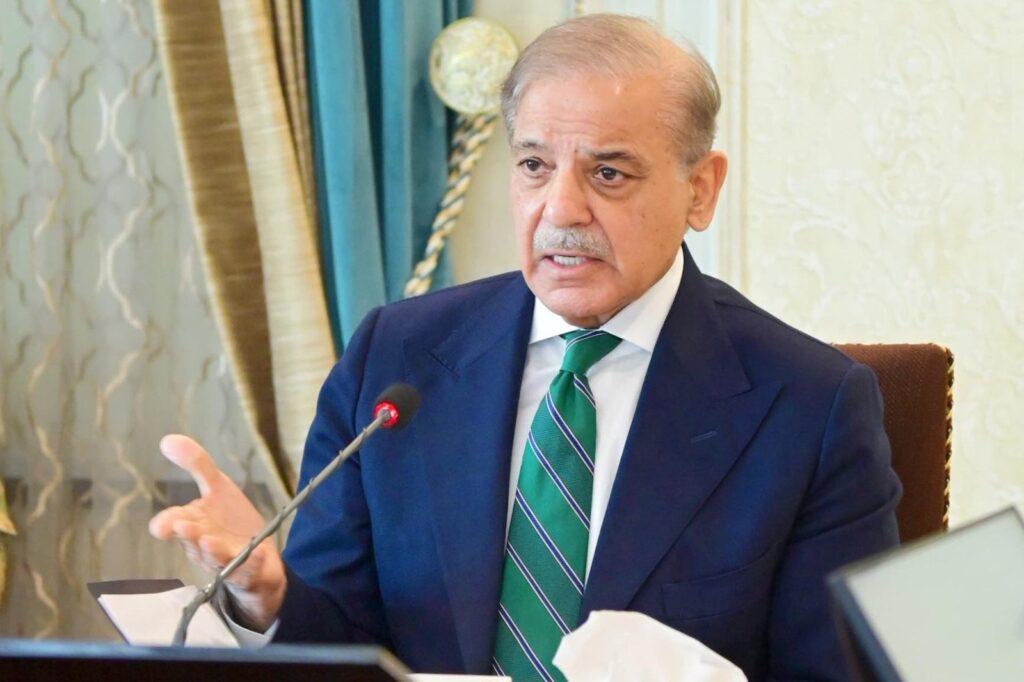Islamabad:
Prime Minister Shehbaz Sharif has constituted a high -level political committee to supervise the implementation of the National Fiscal Pact. The Committee will also work to build a consensus on the burden of debt between the Federation and the provinces, and will coordinate the development of the critical infrastructure of water in the midst of Indian aggression.
The Vice Prime Minister Ishaq Dar, of the president of the Pakistan Muslim League (PML-N) and the Party of the Peoples of Pakistan (PPP), Bilawal Bhutto Zardari, will be the co-chants of the Committee of eight members, according to the instructions issued by the Prime Minister’s office.
According to the decision taken after a meeting between the PML-N and the PPP in Lahore on Sunday, the other members include defense ministers; planning; finance; Economic and law, as well as the Pakistan Attorney General (AGP).
In particular, the government has not included any representative of the opposition Pakistan Tehreek-E-Insaf (PTI), which governs Khyber-Pakhtunkhwa (KP). Without PTI’s participation, achieve a consensus on the National Fiscal Pact and meet the fiscal objectives agreed with the International Monetary Fund (IMF) can be difficult.
The Fiscal Pact had been signed by the finance ministers of federal and provincial governments in September 2024 as a condition of the IMF. But the implementation remains slow since the provinces, particularly Sindh, have concerns regarding assuming some spending responsibilities.
The Fiscal Pact is aimed at rebalancing the responsibilities of spending and better aligns provincial and federal fiscal policies. The provinces agreed to return the specific expenses of federal governments in line with the 18th constitutional amendment, but the implementation could not begin.
“From fiscal year 2026, all the new PSDP [Public Sector Development Programme] The projects that affect a single province are expected to be financed directly from the provincial budgets, “says the new report at the IMF personnel published on Saturday.
“The prime minister has been pleased to establish the following high -level committee to supervise, coordinate and guarantee the effective implementation of the National Fiscal Pact,” said the instructions issued by the Prime Minister’s office.
The Finance Division will notify the Committee and serve as its Secretariat, according to the decision. The Committee will share the proposals that require consideration in federal and provincial budgets within 10 days.
One of the most important terms of reference in the committee is to develop a consensus and the way to follow on the issues and challenges of national importance, including, among other things, the burden of debt, the development of critical infrastructure and water safety.
The cost of service of the debt will be RS8.7 billion or half of the new fiscal year budget. The federal government has been thought to convey part of this cost to the provinces. However, according to the Constitution, the provinces are not obliged to share these responsibilities.
Pakistan also needs to build new water storage facilities in the warfoot to deal with the illegal act of India to block the Pakistani water participation under the World Bank Basin Treaty (IWT).
According to the Office of the Prime Minister, the High Level Committee will provide strategic supervision and direction to guarantee the effective and timely implementation of all commitments under the National Fiscal Pact by federal and provincial governments.
The Committee will monitor the implementation of income measures, including the alignment of agricultural income tax with the FBO Income Tax Regime, the transition of GST services to a negative list, the development of a common framework for property taxes and efforts to improve compliance and general tax administration.
Although provincial governments have approved the respective agricultural tax laws, their implementation remains challenging. Due to this fact, the IMF has imposed a new condition under the $ 7 billion package to develop a delivery mechanism.
“Implement the new AIT laws through a comprehensive plan, including the establishment of an operational platform for the processing of declarations, identification and registration of taxpayers, a communication campaign and a compliance improvement plan,” reads the second of the 11 new conditions.
The Prime Minister’s office declared that the High Level Committee will supervise the implementation of expense reforms, including the highest provincial contributions to higher education and social protection, the Benazir Income Support Program (BISP), the realignment of the PSDP responsibilities and the elimination of provincial support price regimes.
The Committee will also trace progress in government measures, such as the deployment of the Electronic Acquisition and Provision System of Pakistan (E-PADS), the adoption of green budget labeling, the digitalization of payments and government records, and coordination in money laundering and the combination of terrorist financing together with the relevant agencies.
The IMF report stated that the Pakistan Public Procurious Authority (PPRA) is expanding electronic Ymas to federal agencies and provincial governments. At the end of February 2025, a total of 623 acquired agencies, belonging to 51 federal ministries and departments are already integrated into the system.
In line with national fiscal agrees, two provinces continue to increase their use of electronic thims; With another province already piloting its use in 2025 and the fourth province that reviewed its current system for integration with E-Pads, said the IMF.
Until now, of the 32,359 acquisition contracts planned worth RS821.1 billion at the federal level in electronic, 21,339 contracts that cost RS74.5 billion have been completed.
The high -level committee will also serve as a platform to resolve implementation challenges and facilitate consensus between federal and provincial governments and relevant interested parties, according to the decision.
The IMF report stated that “it recommended that the authorities develop a framework to guide the provincial investment of its accumulated cash surpluses in governmental values through non -competitive tenders.”




